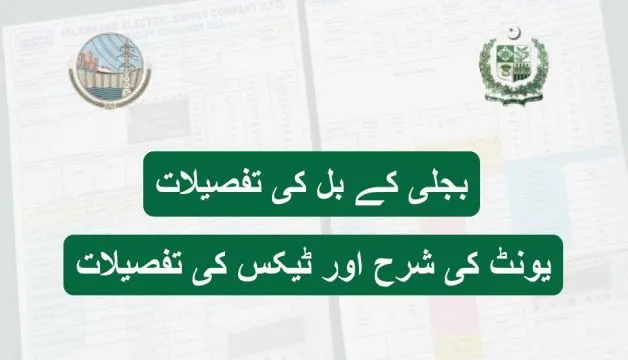Last Updated on: 25th August 2025, 02:26 pm
Electricity Unit Price in Pakistan
Electricity prices in Pakistan have been on a continuous upward trend, with variations based on the province of residence. Different divisional electric supply companies in Punjab, Sindh, Balochistan, and KPK play a vital role in determining electricity rates.
The National Electric Power and Regulatory Authority (NEPRA) is responsible for managing and controlling Pakistan’s electricity supply. NEPRA determines the electricity rates supplied to the government, and these rates are reflected in your monthly electricity bill.
The Water and Power Development Authority (WAPDA) takes charge of electricity and water resources in Pakistan, ensuring both these essential utilities are provided to the public. They are also involved in implementing new arrangements related to electricity and water services in the country. You can check also, the CNG Per KG Price in Pakistan Today.
Current Per Unit Bijli Bill Rate in Pakistan
As of the latest update, the price of electricity in Pakistan stands at 65 rupees per unit, with a minimum charge of 22 rupees per unit. NEPRA has recently increased electricity rates under government supervision, making it crucial to stay informed about these changes.
The following table provides a detailed breakdown of electricity rates:
| Units | Price (Rupees) |
|---|---|
| 0-100 | 65 |
| 101-200 | 65 |
| 201-300 | 65 |
| 301+ | 65 |
Domestic Rate Per Unit Rate
| Number of Units | Rate per 1 Unit (kWh) | Last Updated On |
| Below 50 | Rs. 5.94 | 27th February 2025 |
| 1-100 | Rs. 22 | 27th February 2025 |
| 101-200 | Rs. 32 | 27th February 2025 |
| 201-300 | Rs. 37 | 27th February 2025 |
| 301-400 | Rs. 43 | 27th February 2025 |
| 401-500 | Rs. 47 | 27th February 2025 |
| 501-600 | Rs.49 | 27th February 2025 |
| 601-700 | Rs.52 | 27th February 2025 |
| More than 700 | Rs.65 | 27th February 2025 |
Commercial Connection Per Unit Rate
| Load Type | Rate per Unit (kWh) | Last Updated On |
| Less than 5kW load | Rs. 38.80 | 27th February 2025 |
| More than 5kW load | Rs. 40.26 | 27th February 2025 |
List of Electricity Distribution Companies in Pakistan
Several electricity distribution companies operate in Pakistan, ensuring a reliable supply of electricity. These include:
- Faisalabad Electric Supply Company (FESCO)
- Gujranwala Electric Power Company (GEPCO)
- Hazara Electric Supply Company (HAZECO)
- Hyderabad Electric Supply Company (HESCO)
- Islamabad Electric Supply Company (IESCO)
- Karachi Electric Supply Company (KESC)
- Lahore Electric Supply Company (LESCO)
- Multan Electric Power Company (MEPCO)
- Peshawar Electric Power Company (PESCO)
- Quetta Electric Supply Company (QESCO)
- Sukkur Electric Power Company (SEPCO)
- Tribal Electric Supply Company (TESCO)
Electricity Price Structure in Pakistan
The cost structure for electricity in Pakistan comprises various components, including unit rates, meter fare (applicable to some consumers), service charges (applicable to some consumers), adjustments related to fuel prices, R-Surcharge, surcharge, and QTR Tariff ADJ/DMC.
The government also levies electricity duty, TV fees, General Sales Tax (GST), and radio fees.
Electricity Unit Prices in Lahore 2025
In Lahore, the electricity unit prices for 2025 have seen an increase when compared to the previous year. The new rates are as follows:
- 0-100 Units: 32 Rupees
- 101-200 Units: 37 Rupees
- 201-300 Units: Almost 43 Rupees
It’s worth noting that these rates may change in the future, and with economic improvements, there’s hope for a reduction in electricity per unit prices in Pakistan. K-Electric Duplicate Bill Check Online
How to Calculate Your Electricity Bill
Calculating your electricity bill involves multiplying the units consumed by the base tariff, and adding fuel adjustment charges, taxes, and head charges. Peak hour consumption may also impact your bill, with additional charges calculated based on the peak hour rate.
For instance, if you consume 300 units in a month, with 100 units during peak hours, your bill can be calculated as follows:
- Base Tariff = 200 x 20 = Rs 4,000
- Fuel Adjustment Charges = Rs 0 (assuming no change in fuel prices)
- Tax & Surcharges = Rs 4,000 x 0.2 = Rs 800 (assuming 20% of base tariff and FAC)
- Peak Hour Charges = 50 x (30.69 – 20) = Rs 534.69
Your total bill calculation would be Rs 4,000 + Rs 0 + Rs 800 + Rs 534.69 = Rs 6,334.69 for the month.
Understanding the Implications of Rising Electricity Prices
The impact of increasing electricity prices is far-reaching, affecting both urban and rural communities. Even those fortunate enough to access cheaper electricity are not immune to its effects.
When the cost of power generation rises, it has a ripple effect on all energy sources in Pakistan, including natural gas, oil, and coal, as they are extensively used for electricity production.
Higher electricity prices also compel households and businesses to rethink their power consumption, which, in turn, impacts not only individual consumers but also businesses and farmers that rely on electricity for their operations.
The most significant concern arises when rising prices force unscrupulous businesses or governments to ration electricity or, in extreme cases, disconnect services due to escalating costs. Such actions can lead to a substantial reduction in production and hinder societal progress when access to essential resources is compromised by soaring electricity prices.
It is evident that comprehending the dynamics of electricity pricing is crucial for citizens, businesses, and governments, but the question remains: what can be done to mitigate these challenges? You can check also, the 1kg LPG Rate Today.
Strategies to Reduce Electricity Costs and Consumption
Reducing electricity bills in Pakistan can be achieved through diligent efforts to curtail power consumption. Here are some practical tips to help you cut down on your electricity usage:
- Unplug idle appliances: Many devices, such as TVs, DVD players, and computers, continue to draw power even when turned off. Unplugging them when not in use for extended periods can make a substantial difference.
- Invest in energy-efficient appliances: Seek out Energy Star-certified products, which are known for their efficiency and can lead to long-term savings on your utility bills.
- Switch to LED lightbulbs: LED bulbs are significantly more energy-efficient and can result in notable monthly electricity savings.
- Educate yourself on energy conservation: Consult an electrician or conduct online research to discover effective ways to conserve energy and optimize available resources in Pakistan.
By implementing these straightforward strategies, you can start lowering your electricity expenses and saving money each month.
Harnessing the Power of Solar Energy in Pakistan
Embracing solar energy is a promising approach to reduce electricity costs in Pakistan, while also contributing to a cleaner environment. The advantages of solar energy include:
1. Lower Electricity Bills: Solar energy substantially reduces your electricity expenses. It is a renewable energy source, eliminating concerns about resource depletion. Furthermore, solar cell costs have decreased due to technological advancements, making solar power more cost-effective than ever.
2. Reducing Carbon Footprint: Solar energy plays a pivotal role in reducing carbon emissions and promoting a greener environment. It minimizes reliance on fossil fuels, which contribute to air pollution and global warming. Embracing solar energy in Pakistan not only saves you money but also benefits the environment.
By harnessing the low-cost, renewable power source of solar energy, you can make a significant impact on both your electricity bills and environmental sustainability. List of Top 10 Solar Companies in Pakistan
Government Initiatives and Subsidies for Affordable Electricity
The Pakistani government has established several programs and subsidies to help residents and businesses reduce their electricity bills. These initiatives include:
1. Discounts for Low-Income Households: Low-income households, as determined by the country’s poverty line, receive monthly discounts on their electricity bills. These discounts provide crucial financial relief for families facing economic hardships.
2. Energy Efficiency Incentives: The government offers incentives for adopting energy-efficient appliances and systems, such as solar panels. These incentives are designed to encourage the adoption of energy-efficient options, resulting in reduced monthly electricity costs and a smaller carbon footprint.
3. Other Programs: In addition to discounts and incentives, Pakistan offers various other programs to reduce electricity bills. These encompass subsidies for solar energy systems, tax breaks on energy-saving equipment, improved financing options for homeowners transitioning from traditional grid power, and more.
With these government programs in place, lowering your electricity expenses in Pakistan has become more accessible than ever before.
By taking advantage of these government initiatives, you can make significant strides in reducing your electricity bills and contribute to a more sustainable and cost-effective energy landscape in Pakistan.
Check also, How To Do WAPDA Online Duplicate Bill Check
Final Thoughts
Electricity rates in Pakistan have witnessed an increase, leading to challenges for the public, especially amidst rising inflation. This article aims to provide you with comprehensive information on electricity billing in Pakistan. Stay connected with our website for updates and information that can help you navigate these changes effectively.
📰 Meet Our Newest Author: Farhan Ahmed
We are thrilled to welcome Farhan Ahmed, a dynamic addition to our team of seasoned writers at TheEducationistHub.com. Farhan Ahmed is a highly skilled professional with a robust background in the realms of SEO, blogging, and the latest news trends.
🎓 Educational Background: Farhan Ahmed is a proud graduate of Karachi University, holding a Master’s in Business Administration (MBA). This academic foundation has not only equipped Farhan Ahmed with a strategic mindset but has also instilled a deep understanding of business dynamics.
💼 Professional Journey: With an impressive 4 to 5 years of hands-on experience in the field, Farhan Ahmed brings a wealth of expertise to our newsroom. Having navigated the intricacies of SEO and blogging, Farhan Ahmed has honed the art of crafting content that not only engages but also performs exceptionally well in the digital landscape.
📝 Writing Prowess: Farhan Ahmed specializes in distilling complex information into digestible and engaging pieces. Their knack for identifying and covering trending news and updates ensures that our readers stay well-informed on the latest developments across various domains.
🌐 Digital Savvy: In an era where the online landscape is ever-evolving, Farhan Ahmed is well-versed in leveraging digital tools and strategies to maximize the reach and impact of their work. Their proficiency in SEO ensures that our content not only informs but is also easily discoverable by a wider audience.
We are confident that Farhan Ahmed will play a pivotal role in enhancing the quality and relevance of the content we deliver to our readers. Join us in extending a warm welcome to Farhan Ahmed as we look forward to an exciting journey of insightful updates and news coverage.
Stay tuned for the latest from TheEducationistHub.com with Farhan Ahmed on board!




![Fitrana Fidya Rate for Ramadan 2025 [OFFICIAL]](https://www.theeducationisthub.com/wp-content/uploads/2025/02/Fitrana-Fidya-Rate-for-Ramadan-Pakistan.webp)
